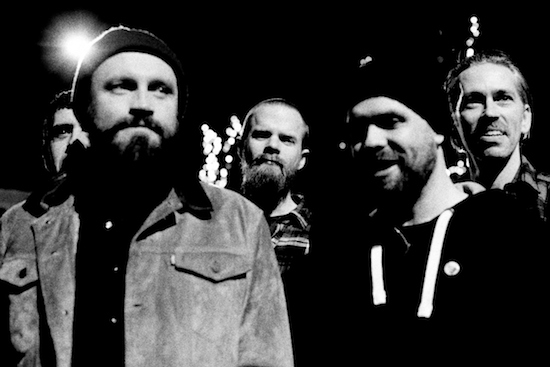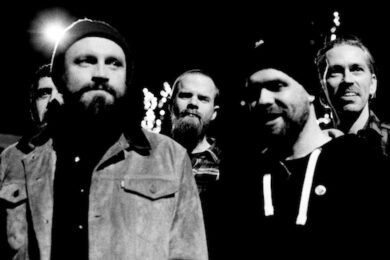In the misty annuls of time (betwixt the ancient passages of Hawklore) it was said that Hawkwind’s electronics man Dik Mik had a number of strange boxes, capable of inducing serious physical baggage. Dik Mik could – so the story went – make any given audience member soil themselves at whim, by dent of an audio generator with added ring modulator, bought on the Tottenham Court Road, assembled on a little table and tweaked to oblivion. And although some wrongly associate Hawkwind with flowery vibes, they’re actually more readily summed up by this kind of scenario – aboard the Hawkship or b’cacked: a churning evocation of Ladbroke Grove squat nightmares, or as Lemmy had it: ‘a black nightmare’.
There are parallels to be drawn with the Sex Swing approach here. They also operate at the grubbiest end of brain storm, body strike sonic alarm, propagating a churning crooked noise that hypnotizes by dent of heavy groove and grinding volume. They make music that is steeped in orphic grub, evoking a decrepit sideways hinterland: empty pub carparks, forgotten Medway towns, dilapidated Fenland outhouses, chemical nostril burn, dark South London terraces – music of encroaching dread and physical release. But while the reference points are something of a nerve shredding jangle – Suicide, Hawkwind, Motorhead, free jazz, the sub rupturing low end of Sleep- this is free-standing music made by men of severe chops.
Indeed, they’re a group of impressive credence. Tim Cedar (keyboards) was formerly of Ligament, front man of Part Chimp and is also the manager of Dropout Studios in Camberwell; Jason Stoll (bass) is a member of both Mugstar and Bonnacons of Doom and also runs God Unknown Records; Colin Webster (sax) plays with Dead Neanderthals and numerous other free jazz projects; Dan Chandler (vocals) and Stu Bell (drums) were in Dethscalator while Jodie Cox (guitar) also plays with Seattle drone masters Earth.
Forming in 2014, Sex Swing released a split 7" (‘Nighttime Worker’) with Clinic on Jason’s God Unknown label and played a number of festivals, including Birmingham Supersonic and Raw Power.
This week, however, sees the release of debut album Sex Swing on the Quietus Phonographic Corporation – an even weightier, sweatier and more tangled proposition than you may have hoped for. Straying deep into murky canal waters – past the rusting shopping trolleys and unidentifiable body parts – Sex Swing pulsates, chugs and hisses in malevolent intent, laying down lumbering sonic threshings like a psychotic farmer scorned: a wall of sound both foreboding and slippery.
The Quietus spoke to Dan Chandler (vocals), Jason Stoll (bass) and Stu Bell about chess boxing, Suffolk murder ballads, improvisation and the miracle that they’re even here at all.
Stu, I understand you were once struck by lightning?
Dan Chandler: He’s also been in a plane crash, you know?
Jason Stoll: Not at the same time though….
Stu Bell: It was when I was a kid; about 13 years old. There was a forest fire near where my brother and I used to play.
JS: Did you have your matches with you? (laughs)
SB: No. My brother was a bit of a pyromaniac though. There was this fucking massive storm and this lightning bolt struck a bush that I was next to; but it hit me on the leg. It blew me literally about 10 feet away; a patch of my leg had no hair for about 15 years.
JS: And you had a plane crash as well, didn’t you?
SB: That was about 15 years later in Thailand. Light aircraft. The plane didn’t stop in the country it was supposed to, which was Thailand; it kept going until it was actually in Burma…. but they’re not experiences I like to revisit, really.
Understandably…. Dan, I also have to ask you about ‘chess boxing’. My editor John Doran mentioned that you take part in something called ‘chess boxing’. I’d not heard of it, looked it up before we spoke and yes – it actually is boxing combined with chess. It sounds immense.
DC: Indeed. Chess boxing is a sport which combines chess with boxing. I entered a completion in April. A guy from Finland came over and we had a match. It was six rounds of chess followed by boxing after each round
JS: The Finnish hammer!
‘The Finnish Hammer’!? Wow. Do you have a name Dan?
DC: I don’t have a name.
SB: It’s like a baddy in the old British wrestling matches in the 70’s. Just ‘DAN’ (laughs) ‘DAN!’ or ‘STEVE!’
So how does it work? Do you alternate between the two?
DC: You play three minutes of chess; then you do two minutes of boxing; three minutes of chess; two minutes of boxing; three minutes of chess; two minutes of boxing. Alternate between them like that. So the idea is that when you come to the chess, your brain is a bit screwed up from…
JS: Being punched again and again!
DC: Yeah, your brain is a bit screwed up from the boxing. It actually makes for quite an interesting game of chess (laughs). But I went the distance.
Amazing. And is this something that you’d like to continue in the future?
DC: I think it’s something that I’ll carry on with at some point.
What provided the initial impetus to form Sex Swing? Was there an initial sound you were going for?
JS: Actually, when we came up with the idea of the band, the first idea was to come up with something along the lines of Motorhead.
SB: And it didn’t work out for some reason.
DC: Maybe because we didn’t have a guitarist at the time (LAUGHS)
Yeah, fairly essential for Motorhead!
SB: Colin (Webster) joined the band fairly soon after we formed and that tipped us in a certain direction in that he plays really fantastic improvised saxophone.
DC: In a Motorhead style.
JS: But when Colin joined the band he really brought a big Hawkwind thing going on, you know – circa Space Ritual.

I definitely pick up that heavy duty, chaotic kind of vibe. I’m interested in your take on psychedelia actually – by which I mean that kind of full body/mind transference vibe. Physical music. It’s like in that brilliant BBC4 documentary they did on Hawkwind when Lemmy described them as being a ‘black nightmare’. People get the wrong idea about Hawkwind; they’re heavy and scuzzy and nasty. Do you consider Sex Swing a psych band, per se?
JS: It depends how you view psychedelia, really. In the past, psychedelia may have meant a band like The Beatles or 13th Floor Elevators. But for me, psychedelia is about making music that alters people’s perceptions and reality in that moment -it’s about taking people somewhere else, taking them to a new space.
Hawkwind and Motorhead aside, what else are you guys feeling?
SB: we all listen to really varied stuff. Everything from noise to blues to free jazz. Whatever’s good really. I guess you guys are probably the same…
DC: Massively wide varied tastes, really (laughs). It might be stuff from the Amazon rain forest or Classic FM (laughs).
Can you tell me a little bit about your working practices? Is improvisation a part of your sound?
DC: Oh, absolutely. Most of our tracks are improvised to a greater or lesser extent. We’ll often have a base to improvise around and most of the tracks come together like that; we improvise on a theme but it changes almost every time we play it. We don’t tend to play the same thing in the same way all the time.
JS: It has always worked quite organically. We’ll get together in a rehearsal studio in London and get together a few ideas – I’ll come in with a bassline or Stu will come in with a drumbeat and we’ll will often work around that, build on that. As Dan says, our songs are certainly quite organic in the structural sense. A lot of the stuff on the record is quite elongated, actually; quite changeable. There is a definite sense of fluidity – in the actual structure of the songs – and that is something that we find very exciting.
DC: The last track on the album (‘The Murder Of Maria Marten’) we were actually playing completely differently right up until that session; we were trying it in a completely alternate way – it was essentially a completely different song – but the take you hear on the album, that was the take that it ‘happened’ on whereas on the others it didn’t quite work. We were just arsing about really. I think there were only three of us in the studio – the others had gone out for a smoke. We started playing and Jason and Stu walked in halfway and joined in. It worked really well.
How about playing live. You’ve done a select few gigs over the past few years – not least Supersonic – how does it work in the live setting? Is it the same kind of approach?
SB: It’s really good when it happens. We had some really good connections because of previous bands we’d played in, which meant that as soon as we formed we got to a bunch of great festivals and that was really helpful. I mean, this is a really interesting band to play in – because the music is essentially different each time that we play it.
SB: I’d say it also depends on what the venue is like; what the crowd is like. A lot of what we do is dictated by the vibe and the setting on the actual night, rather than us just getting up there and hammering out the same old stuff. We essentially react to the setting and what is happening around us.
DC: Absolutely. I think that was actually one of the problems we came up against in our old band (Dethscalator). We were in a bit of a rut, we certainly had a bit of a block, writing wise, and we weren’t coming out with much new stuff. It felt like we were rehashing the same old sounds and that was what led us to break up in the end. This feels very different from that situation.
Do you feel an affinity to the wilder/noisier end of the psych world? I’m thinking specifically of bands like Gnod and Sly & The Family Drone – the more chaotic vibe…
JS: I certainly think that within that scene there is a lot of incredibly good stuff happening, especially with Gnod and Sly & The Family Drone. I really think they are two of the best bands in the country at the moment because they’re challenging a lot of musical boundaries in what they do live. There are a lot of improvisational elements which means that it doesn’t ever get boring. It comes from that philosophy of constantly challenging yourself and pushing yourself to make new sounds.
Could you tell us about your label – God Unknown – Jason? What provided the impetus to start it up? You’ve provided an epicentre for noise, experimental and psych leaning sounds but you’ve also touched on some older and more established bands (I’m thinking of The Bevis Frond and Terminal Cheesecake, specifically). Is the idea of community important?
JS: I’d toyed with the idea of doing a label for some time and I’d always get to hear some great music whilst touring with Mugstar, my other band. So basically I wanted to create a way to support bands who I think are really making great music. I have lots of contacts, so initially it was a case of contacting people I knew to see if they wanted to be released on the label. Obviously, some of the bands are more established than others so it was nice to work out the different combination of bands on the splits that we release. I think the community within the psych / noise / improv / experimental scene is really important and very apparent at the moment. It helps foster a sense of support and a massive sense of encouragement, really. I have friends from all over the planet through being involved: I think one of the greatest examples of this is Supernormal festival, which is defiantly a gathering of the good people.
You come from Liverpool, a city with a huge musical – and not least psych leaning – heritage. Has the city itself shaped your musical life?
JS: Being in bands in Liverpool has definitely shaped my musical life – but I feel traveling and meeting people outside of the city has probably influenced me more. You know, the spectre of the Beatles hangs heavy over the city but Liverpool always has something brewing culturally and there are a lot of great things happening in Liverpool right now – Psych Fest, Music Week, Light Night.
I’m interested in the production of the album; it’s immensely loud and really quite brutal sounding. Did you have a particular aesthetic in mind for the record?
SB: Tim (Cedar), our keyboard player, is involved in a really good studio in Camberwell called Dropout Studios and we recorded there. We got a guy called John Eaton to engineer it. He’s a really old mate of mine and he’s done a great job.
It’s a real wall of sound – it sounds absolutely massive…
SB: It’s the balance between fidelity, white noise and power. Somewhere in there; somewhere in between all three. I knew Joel could deliver that kind of thing because I’ve heard him do it in the past. It just sounds right, as far as I’m concerned, because you can hear everything – in terms of individual elements – but it is also really full on and quite savage.
I also wanted to ask about your vocals. Your vocal approach is markedly different in Sex Swing to Dethscalator – more intricate and restrained. Can you tell us about the difference in vocal approach?
DC: You’re right – it was a conscious choice to do something different. I guess it has to do with what we’re trying to achieve sonically, which is totally different from Dethscalator. Dethscalator, I guess was about some kind of rage against nothing whereas Sex Swing is closer to watching people (from a distance) fuck in a quiet corner of an industrial estate. And of course, in those kinds of situations you are going to need intricacy and restraint.
Can you tell me a little about The Murder of Maria Marten? Does this refer to the Suffolk Red Barn murder?
DC: Yes, it’s indeed to do with the Red Barn murder. A traditional song made slightly more popular in recent years by Shirley Collins and the Albion Band. It falls into a category of folk music equivalent to those kind of true crime magazines that old ladies buy. These first three verses in particular put the author into the position of some kind of perverse voyeuristic calypsonian, observing terror, grief, psychosexual obsession & remorse.
She sent the father to the barn
Where he the ground did thrust
And there he found his daughter
Lay mingling with the dust.
My trial was hard, I could not stand,
Most woeful was the sight
When her dear bones was brought to prove
which pierced my heart quite.
Her aged father standing by,
Likewise his loving wife,
And in her grief her hair she tore
She scarcely could keep life.
Sex Swing is released 25 November on tQPC. Preorder the record for cold hard cash via our friends at Norman Records here or Rough Trade here and Drift here. Sex Swing play The Quietus Christmas Bash on December 6th with Bruxa Maria and Meatraffle. Buy tickets here



